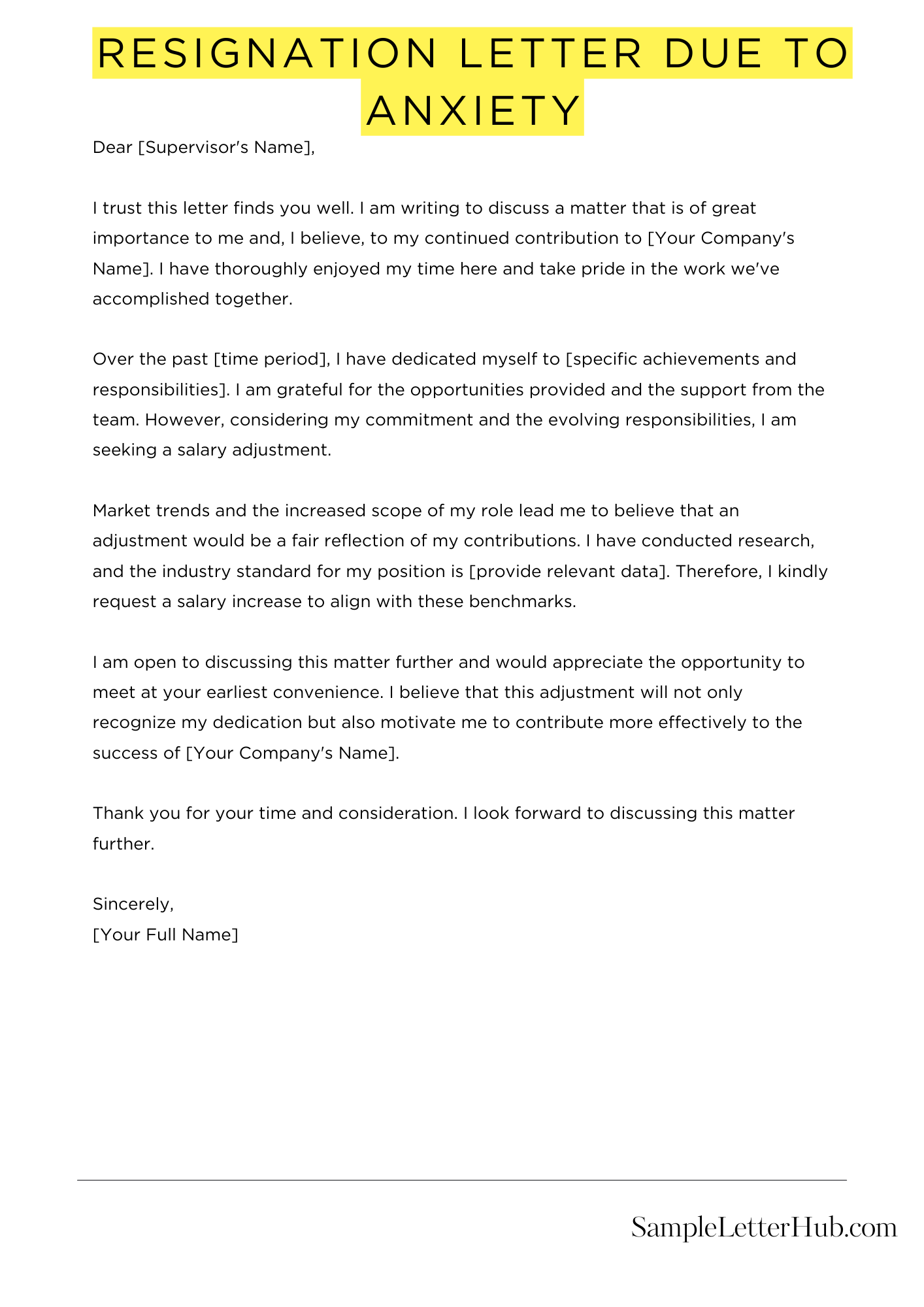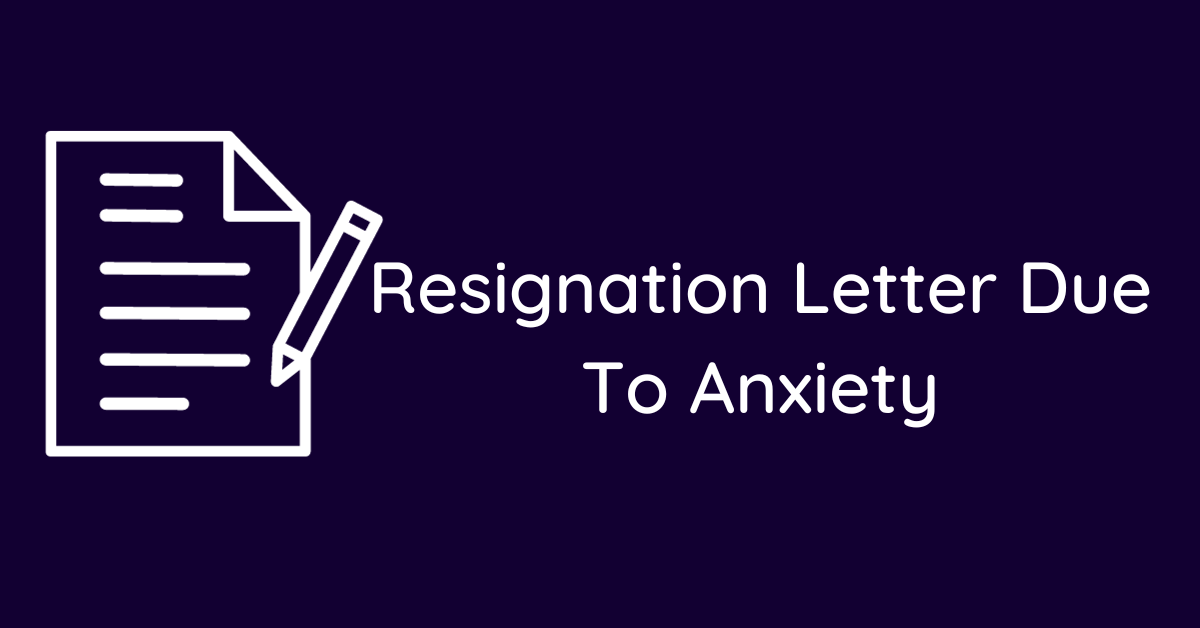Are you struggling with anxiety at work? Do you feel like it’s affecting your ability to perform your job duties? If so, you may be considering resigning from your position.
A resignation letter due to anxiety is a formal letter that you can submit to your employer to inform them of your decision to leave your job due to mental health reasons.
In this blog article, we will provide you with templates and examples of resignation letters due to anxiety.
We understand that writing a resignation letter can be a daunting task, especially when you’re dealing with mental health issues. Our goal is to make it easier for you to communicate your decision to your employer in a professional and respectful manner.
Our sample letters will provide you with a starting point, but we encourage you to personalize them to fit your specific situation.
Remember, your mental health is important, and it’s okay to prioritize it over your job. We hope that our resources will help you navigate this difficult decision and move forward with confidence.
Resignation Letter Due To Anxiety
Dear [Recipient’s Name],
I hope this letter finds you well. It is with a heavy heart that I am writing to formally resign from my position as [Your Position] at [Company Name], effective [last working day, typically two weeks from the date of the letter].
Over the past few months, I have been dealing with increasing levels of anxiety, which has made it challenging for me to perform at my best and maintain a healthy work-life balance. After careful consideration and consultation with medical professionals, I have come to the difficult decision that stepping away from my current responsibilities is in the best interest of my mental health.
I want to express my gratitude for the support and opportunities provided by [Company Name]. This decision is not a reflection of the company or its management but is solely based on my personal circumstances.
I am committed to ensuring a smooth transition during my notice period. I appreciate your understanding and support during this challenging time.
Thank you for the opportunities and experiences at [Company Name]. I am sincerely grateful for the time I’ve spent here.
Sincerely,
[Your Full Name]
Resignation Letter Due To Health And Stress
Dear [Recipient’s Name],
I hope this letter finds you in good health. It is with a mix of emotions that I tender my resignation from my position as [Your Position] at [Company Name], effective [last working day, typically two weeks from the date of the letter].
Over the past few months, I have been facing health challenges and increased stress levels, impacting my ability to fulfill my duties effectively. After consulting with healthcare professionals, I have decided that prioritizing my well-being is necessary, and stepping down from my current role is the best course of action.
I want to express my gratitude for the opportunities and support I’ve received during my time at [Company Name]. This decision is a difficult one, and I appreciate the understanding of the company and its leadership.
I am committed to ensuring a smooth transition during my notice period and will do my best to assist in the handover of my responsibilities.
Thank you for your understanding and support. I am grateful for the experiences and growth I’ve had at [Company Name].
Sincerely,
[Your Full Name]
Immediate Resignation Letter Due To Stress
Dear [Recipient’s Name],
I am writing to inform you of my decision to resign from my position as [Your Position] at [Company Name], effective immediately.
Unfortunately, due to overwhelming stress and personal circumstances, I find it necessary to prioritize my mental and physical well-being. This decision was not made lightly, but I believe it is in the best interest of both myself and the company.
I want to express my gratitude for the opportunities and experiences gained during my time at [Company Name]. I appreciate the support of the team and understand the impact of my abrupt departure.
I am committed to assisting in the transition and handover of my responsibilities to ensure a smooth process during this challenging time. I sincerely hope you understand my situation and respect my decision.
Thank you for the understanding and cooperation.
Sincerely,
[Your Full Name]
Resignation Letter For Mental Health Reasons
Dear [Recipient’s Name],
I hope this letter finds you well. It is with a heavy heart that I submit my resignation from my position as [Your Position] at [Company Name], effective [Last Working Day, typically two weeks from the date of the letter].
Over the past few months, I have been grappling with mental health challenges that have significantly impacted my ability to perform at my best. After careful consideration and consultation with healthcare professionals, it has become clear that taking a step back from my current professional responsibilities is necessary for my well-being.
I want to express my deep appreciation for the support and opportunities provided by [Company Name]. I have learned and grown during my time here, and I am grateful for the experiences and friendships formed along the way.
I am committed to ensuring a smooth transition during the notice period. I am open to discussing a transition plan to pass on my responsibilities and provide any necessary training to my colleagues.
Thank you for your understanding and support during this challenging time. I am optimistic about my journey to recovery and exploring new avenues in the future.
Sincerely,
[Your Full Name]
Resignation Letter Due To Anxiety And Depression
Dear [Recipient’s Name],
I am writing to tender my resignation from my position as [Your Position] at [Company Name], effective [Last Working Day, typically two weeks from the date of the letter]. This decision has not been easy, but it has become clear to me that taking this step is necessary for my health and well-being.
Over the past few months, I have been dealing with anxiety and depression, and despite my best efforts, it has impacted my ability to perform at the level that both you and I expect. After careful consideration and consultation with healthcare professionals, I believe that stepping away from my current professional responsibilities is the right course of action to focus on my mental health recovery.
I am sincerely grateful for the opportunities and experiences I’ve gained during my time at [Company Name]. I have enjoyed working with the talented team and contributing to the company’s success.
I am committed to ensuring a smooth transition during the notice period and am open to discussing a transition plan to pass on my responsibilities and provide any necessary training to my colleagues.
Thank you for your understanding and support during this challenging time. I appreciate the understanding of the management and the entire team.
Sincerely,
[Your Full Name]

How to Write a Resignation Letter Due to Anxiety
Resigning from a job can be a difficult decision, especially when it is due to personal reasons such as anxiety. Writing a resignation letter can be equally challenging, as it requires you to convey your thoughts and feelings in a professional manner. In this article, we will guide you through the process of writing a resignation letter due to anxiety.
1. Start with a Clear Statement
Begin your letter with a clear statement of your intention to resign. This will help your employer understand the purpose of your letter and avoid any confusion. You can start by stating your name, position, and the date of your resignation.
2. Explain the Reason for Your Resignation
It is important to explain the reason for your resignation, especially when it is due to anxiety. Be honest and straightforward in your explanation, but avoid going into too much detail. You can simply state that you are resigning due to personal reasons related to your mental health.
3. Express Gratitude
Expressing gratitude is an important part of any resignation letter. Thank your employer for the opportunities and experiences you have gained during your time with the company. This will help maintain a positive relationship with your employer and leave a good impression.
4. Offer to Help with the Transition
Offering to help with the transition can show your employer that you are committed to ensuring a smooth handover. You can offer to train your replacement or provide any necessary information to help with the transition process.
5. Provide Contact Information
Providing your contact information is important, especially if you wish to maintain a professional relationship with your employer. Include your email address and phone number so that your employer can contact you if necessary.
6. Keep it Professional
It is important to keep your resignation letter professional and avoid any negative comments or criticism. Remember that this letter will be a part of your employment record, and you want to leave a positive impression.
7. Seek Support
Resigning due to anxiety can be a difficult and emotional process. It is important to seek support from friends, family, or a mental health professional. Remember that you are not alone, and there are resources available to help you through this challenging time.
FAQs About Resignation Letter Due to Anxiety
1. What is a resignation letter due to anxiety?
A resignation letter due to anxiety is a formal letter written by an employee to their employer, informing them of their decision to resign from their job due to anxiety-related issues.
2. What should be included in a resignation letter due to anxiety?
A resignation letter due to anxiety should include the reason for resigning, the date of resignation, and a brief explanation of the anxiety-related issues that led to the decision to resign.
3. How should I approach my employer about my anxiety-related issues?
It is important to approach your employer in a professional and respectful manner. Schedule a meeting with your employer and explain your situation. Be honest and open about your anxiety-related issues and how they are affecting your work.
4. Can I take time off work for my anxiety-related issues?
Yes, you can take time off work for your anxiety-related issues. You may be eligible for sick leave or other forms of leave, depending on your employer’s policies.
5. Should I seek professional help for my anxiety-related issues?
Yes, seeking professional help for your anxiety-related issues is highly recommended. A mental health professional can provide you with the support and guidance you need to manage your anxiety and improve your overall well-being.
6. How can I manage my anxiety in the workplace?
There are several strategies you can use to manage your anxiety in the workplace, such as practicing mindfulness, taking breaks when needed, and seeking support from colleagues or a mental health professional.
7. What are my options if I am unable to continue working due to my anxiety-related issues?
If you are unable to continue working due to your anxiety-related issues, you may be eligible for disability benefits or other forms of financial assistance. It is important to speak with a mental health professional and a financial advisor to explore your options.
Related:
- Physician Retirement Letter To Patients ( 5 Samples )
- Property Management Letter To Owners ( 5 Samples )
- Change Of Ownership Letter To Vendors ( 5 Samples)
- Letter To Extend Maternity Leave ( 5 Samples)
- Authorization Letter For Minor To Travel Without Parents (5 Samples)

